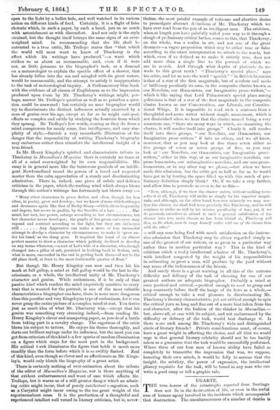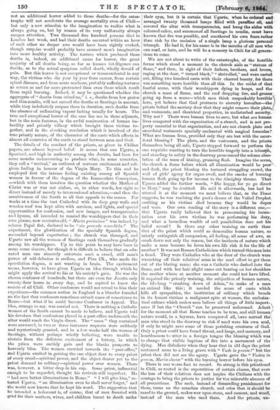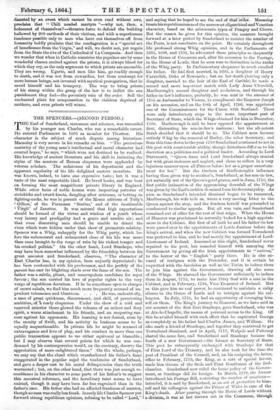UGARTE.
THE true. horror of the catastrophe reported from Santiago does not lie in the destruction of life, or even in the awful sum of human agony involved in the incidents which accompanied that destruction. The simultaneousness of a number of deaths is
not an additional horror added to those deaths—for the catas- trophe will not accelerate the average mortality even of Chili— but only a new stimulus to the imagination to realize what is always going on, but by reason of its very uniformity always escapes attention. Two thousand five hundred persons died in London last week, and had their deaths occurred within an hour of each other no deeper awe would have been rightly evoked, though surprise would probably have aroused men's imagination into more healthy activity. The torture which produced these deaths is, indeed, an additional cause for horror, the great majority of all deaths being, so far as human intelligence can decide, as to the actual symptom called death, wholly devoid of pain. But this horror is not exceptional or transcendental in any way, the victims who die year by year from cancer, from certain spinal diseases, and from acute madness, probably suffering tortures as severe as and far more protracted than even those which result from rapid burning. Indeed, it may be questioned whether the aggregate of " deaths from crinoline," i. e., deaths from low grates and thin muslin, will not exceed the deaths at Santiago in amount, while they indefinitely surpass them in duration, such deaths from the absence of suffocating vapour lasting usually for hours. The true and exceptional horror of the case lies not in these adjuncts, but iu the main features, iu the awful conjunction of human im- becility and priestly villany which brought these victims to- gether, and in the shocking revelation which it involved of the true priestly nature, of the character of the caste which affects in almost all countries of the earth to stand between man and God.
The details of the conduct of the priests, as given in Chilian papers, are almost beyond belief. It seems that one Ugarte, a Spaniard, and high in authority among the Jesuits, had been for some months endeavouring to produce what, in some countries, they call a " revival," an outburst of nervous excitement and reli- gious feeling in honour of the Virgin Mary. To this end he employed first the intense feeling existing among all Spanish women in favour of the dogma of the Immaculate Conception, —which with them involves the question whether the Mother of Christ was or was not sinless, or, in other words, her right to direct instead of merely to intercessional adoration,—and then the sensitiveness of the South to all that appeals to the senses. For weeks at a time the vast Cathedral with its deep grey walls and wooden roof was kept alive with services, and lights, and special opportunities for confession, and new images, and transparencies and hymns, all intended to remind the worshippers that in their own phrase, now centuries old, " Maria purissima" was indeed, by solemn Papal fiat, declared to be "sin peccado concebida." The experiment, the glorification of the specially Spanish dogma, succeeded beyond expectation ; the church was thronged, and Ugarte saw all the women of Santiago rank themselves gradually among his worshippers. Up to this point he may have been in some sense sincere, for though it is difficult to believe that an edu- cated man can sincerely entertain such a creed, still man's power of self-delusion is endless, and Pius IX., who made the speculation dogma, is not wanting in brain. The excitement seems, however, to have given Ugarte an idea through which he might apply the revival to his or his society's gain. lie was the chosen confessor of hundreds, but there are even for Jesuits only twenty-four hours in every day, and he aspired to know the secrets of all Chili. Other confessors would not reveal to him their experience—the common notion in England is a blunder founded on the fact that confessors sometimes submit cases of conscience to Rome—but what if he could become Confessor in Appeal. The idea, strange to say, was carried out. There is nothing a Catholic woman of the South cannot be made to believe, and Ugarte told his devotees that confessions placed in a post-office underneath the altar would reach the Virgin direct. The " cases " they contained were answered, in two or three instances requests were suddenly and mysteriously granted, and in a few weeks half the women of Santiago, without perhaps wholly believing, were unable to abstain from the delicious excitement of a lottery, in which the prizes were earthly gain and the blanks passports to heavenly bliss. The women crowded towards the " postoffice," And Ugarte exulted in gaining the one object dear to every priest of every creed—spiritual power, and the object dearer yet to the priest doomed .to celibacy—spiritual power over women. There was, however, a bitter drop in his cup. Some priest, influential enough to be regarded, thought his revivals still imperfect. He " had seen better illuminations in Rome." " I will give him," re- torted Ugarte, " an illumination even he shall never' forget," and the world now knows that he kept his word. The suggestion that he intended a holocaust is, of course, that of men frenzied with • grief for their mothers, wives, and children burnt to death under
their eyes, but it is certain that Ugarte, when he ordered and arranged twenty thousand lamps filled with paraffine oil, and covered the altar with transparencies, and hung the aisles with coloured calico, and summoned all Santiago in muslin, must have known that fire was possible, and smothered his own fears rather than risk by the omission of a single lamp a glorious personal triumph. He had it, for his name is in the mouths of all men who can read, or hate, and he will be a memory in Chili for all genera- tions to come.
We are not about to write of the catastrophe, of the horrible forms which stood a moment in the church aisle as " statues of flame," and then, in sight of their fathers, brothers, and lovers, raging at the door, " turned black," " shrivelled," and were carted out, filling two hundred carts with their charred beauty, for there was something more horrible than all this. In the midst of that fearful scene, with their worshippers dying in heaps, and the church a mass of flame, and the roof dropping fire, and groans going up from a scene—which men think unspeakably horrible \ here, yet believe that God protracts to eternity hereafter—the priests bolted the sacristy door that they might remove their plate, and vestments, and theatrical properties, in undisturbed security. Why not ? There were human lives to save, but what are human lives compared with the organization of a church, and is not pro- perty essential to that organization, and are not church plate and sacerdotal vestments specially enchanted with magical formulas? What are human lives, provided only they are lost with the sacer- dotal blessing? The plate, and the vestments, and the priests themselves being all safe, Ugarte stepped forward to perform the one requisite wanting to turn the horrible tragedy into a triumph, and standing in safety in the doorway pronounced the solemn abso- lution of the mass of hissing, groaning flesh. Imagine the scene, the church a flame before which all illumination would be poor' and and dark, the priest blessing the tortured struggling crowd, the wail of girls' agony for organ swell, and the smoke of burning human flesh going up for incense to the Almighty throne. That Ugarte added the further words, " Die happy, for ye go direct to Mary," may be doubted. He said it afterwards, but had he uttered it at the moment we must believe that, as the Times suggests, he was realizing the poet's dream of the Veiled Prophet exulting as his victims died because they would be dupes and were. Our own reading of the story is a different one,— that Ugarte really believed that in pronouncing his incan- tation over his own victims he was performing his duty, and what a boundless wealth of evil possibilities does not his belief reveal ? Is there any other training on earth• than that of the priest which could so demoralize human nature, so utterly extinguish all compassion, all feeling, all sense of awe, so crush down not only the reason, but the instincts of nature which make a man because he loves his own life risk it for the life of another? It was not Roman Catholicism whioh turned this man into a fiend. They were Catholics who at the door of the church were wrenching off their relatives' arms in the mad effort to get them out of the blazing mass; she was a Catholic who dashed into the flame, and with her hair alight came out bearing on her shoulders the mother whom at another moment she could not have lifted. It required the priestly training, the subjection of human nature, the life-long " crushing down of Adam," to make of a man an animal like this.; it needed the geese of caste which kills all sympathies, the institution of celibacy which breeds in its honest victims a malignant spite at women, the ecclesias• tical culture which makes men believe all things of little import- ance ance if but the " Church " can be preserved unharmed. Admit N. for the moment all that Rome teaches to be true, and still human/ nature would, in a layman, have conquered all, have nerved the man who stood in the doorway to risk if need were his own soul, ' if only he might save some of those perishing creatures of God. Only a priest could have found throat, and lungs, and memory, and heartlessness to utter in a foreign tongue the blessing which was to change that visible baptism of fire into a sacrament of the dying. Men disbelieve when they hear that in old days the priest sentenced nuns to a living grave with " Vade in pacem I" but the priest then did not see the agony. Ugarte gave the " Vadete in pacem, Martz elects:" with the burning horror before his eyes.
There is one worse fact to record. So strong is this priesthood in Chili, so rooted is the superstition of certain classes, that even the loss of their relatives does not inspire the Chilians with the courage to bring the priests to justice for the miserable absence of all precautions. The mob, instead of demanding punishment for them, turns on the senseless church, and cries that it should be razed to the ground, makes war upon stone, and cement, and wood, instead of the men who used them. And the priests, un-
daunted by an event which cannot be even read without awe, proclaim that " Chili needed martyrs "—why not, then, a holocaust of themselves?—threaten force to defend the building hallowed by 200 cartloads of their victims, and with a superhuman insolence possible only to men who have cut themselves off from humanity boldly proalaim that the conflagration is a " special act of beneficence from the Virgin," and will, we doubt not, yet regain from the State the site of the Cathedral of La Compania. And then we wonder that when in Catholic countries the populace are by some wonderful chance excited against the priests, it is always blood for which they cry, as the only argument to which priests are amenable. They are wrong. Ugarte, and men like him, go readily enough to death, and it was not from cowardice, but from contempt for mere human beings, not invested with mystical prerogatives, that he saved himself and his trumpery. The way to bring priests of his stamp within the grasp of the law is to inflict the one punishment they feel—the pecuniary ruin of the order. Sell the enchanted plate for compensation to the children deprived of mothers, and even priests will wince.


































 Previous page
Previous page